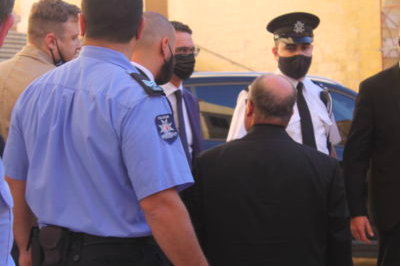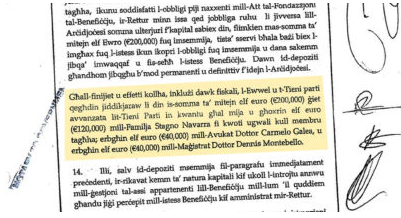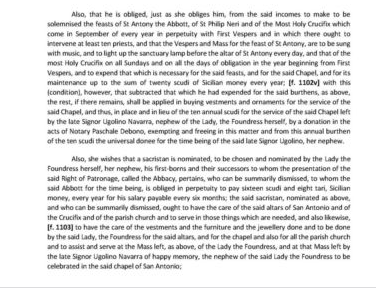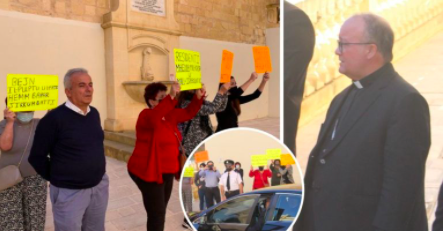Testimony of Archbishop Charles Scicluna was cut short before it reached its climax and, in some instances, raised new troubling questions.
The archbishop was testifying in a case of a family who are facing eviction from a house built on land leased to their ancestors 130 years ago. The court had more policemen than spectators.
The family are one of many affected by a land grab that has caused agony in Gozo, with some people becoming sick with worry. Some of those residents held a silent protest outside while the archbishop testified inside.
The land grab story, which has been extensively featured in Lovin Malta, is a story of a medieval foundation called Beneficcju ta Sant Antonio Delli Navarra that was set up to raise money for pious deeds.
However, the administrative rector appointed by Scicluna in 2017 has been transferring the foundation’s developable lands to companies who are making millions from the construction of flats – aside from threatening residents with eviction from homes they have had for many years – and this is possible after Scicluna “renounced the right” to veto land transfers of foundation land.
View this post on Instagram
Scicluna’s long-awaited day in court had a tense feel with heavy security arrangements. The Citadel, where the court is situated, was closed to traffic, and the archbishop was surrounded by a ring of six men: four police officers in plain clothes as well as archdiocese officials Michael Pace Ross and Roberto Buontempo. The police presence in the square outside, led by an assistant commissioner, was even heavier.
Inside the courtroom, when Archbishop Charles Scicluna was asked why he “renounced the right” to veto land transfers, he said that “he felt that the archbishop should not enter into [the merits of] and give his consent to every emphyteutical land transfer of property [given that that property] that was not ecclesiastical.”
At one point he admitted that the property in fact belongs to the foundation – not to the church, neither those who claim to be heirs of the foundation– and that the “law” enshrined in the deed of foundation “was amended” by the contracts signed on Scicluna’s behalf.
Then he added that the rector has to “guarantee that the property [of the foundation] remains whole” and is not “touched”, and that the archbishop retained the right to appoint future rectors so that he can see that the rector is “fit for purpose”.
Yet the rector that Scicluna appointed, the lawyer Patrick Valentino, has transferred the largest parcels of developable land to a company called Carravan.
This is owned by the six Stagno Navarra siblings who claim to be descendants of the foundation’s founder, the lawyer Carmelo Galea, and a company called Carrac, which belongs to the family of his [the rector] partner, the magistrate Rachel Montebello. These companies are now making millions from the land and the foundation – which was set up “for all future time” – is losing its most valuable lands in the process.
Throughout the testimony, the rector Valentino, who filed the case in court to evict the family, repeatedly objected to questions that he argued were straying away from the merits and context of the case.
Eventually, one of the main questions – on why the Archbishop appointed Valentino out of more than one nominee for rectorship he had in front of him – remained unasked, and unanswered, because Magistrate Brigitte Sultana held, after the objections of Valentino, that challenging the archbishop’s decree that appointed Valentino was beyond the scope of the case in her court.
This has been a main point of challenge for the family’s defence lawyers. Their argument is that if Valentino’s appointment is incompatible with the rules of the contract of foundation – which specify that if no male descendant of the founder’s nephew could be found, then a priest had to be appointed until a male descendant appears – then Valentino’s capacity to bring the court action, as he has done, would be called into question. Valentino is neither a descendant nor a priest.
Here are other points on which the archbishop’s answers raised further troubling questions.

Paragraph on lawyer and magistrate taken out of the contract
Scicluna played down questions on the fact that, of the fund of €200,000 paid to the archdiocese for pious deeds, €80,000 of it was paid by the lawyer Carmelo Galea and retired magistrate Dennis Montebello, and the rest by the six Stagno Navarra siblings. He said: “The source of funds is important, but the more important thing is that the patrons and others associated with them guaranteed this capital.”
Then he seemed to suggest – the testimony was not clear at this point – that perhaps the Stagno Navarras’ did not have sufficient liquidity and that is why the others had contributed.
Lovin Malta’s investigations have found something odd on this in the contract signed by the archbishop’s legal representative.
In the contract appended to the archbishop’s decree, which authorised his representative to sign, there was a paragraph that specified who contributed what, but this paragraph was taken out of the contract before the parties convened at the notary’s office to sign it into public deed seven days later.

Journalistic investigation contradicts explanation on pious obligations
Archbishop Scicluna said that the archdiocese’ main interest in the foundation was that the pious deeds were fulfilled, and to this end, the archdiocese took these on as its obligations. This was the point for the fund of €200,000 – that the interest raised on that fund would go to pay for the pious deeds.
The archbishop then explained that interest in that sum amounts to around €2,500, and that “the lion’s share” of this interest is going to fund the pious deeds.
These pious deeds range from masses – daily at St Anthony’s side altar of Rabat (Malta) church, weekly in St Paul’s Grotto, twenty-four masses yearly in Qala’s Conception of Our Lady Chapel – to the funding of feasts for St Anthony the Abbot, St Philip Neri, and the Holiest Cross, as well as other annual commemorations, even the employment of a sacristan.
It’s hard to see how all those deeds, including the employment of a sacristan, can be funded by €2,500 annually.
But there is something else: investigations by Lovin Malta earlier this year found that none of the pious deeds – or “obligations”, the word used by the archbishop – are being fulfilled.

None the wiser on whether Stagno Navarras’ are descendants
A point that comes up whenever legal or notarial sources look at the contracts authorised by the archbishop is the lack of evidence appended or cited on the genealogy of the six Stagno Navarra siblings, whom the archbishop accepted as patrons of the foundation on the back of claims that they are descended from the founder.
Asked about what verifications the archdiocese had made on the Stagno Navarra’s claim of descent, the archbishop mentioned a family tree that the elder Stagno Navarra, Richard, who died in 2010, had presented in court thirty years ago. He then mentioned additional unspecified documents that Richard had presented to the archdiocese in “September of 1991.”
Yet Scicluna admitted that the documents were not signed by any expert or genealogist, and he did not know who had sourced those documents or researched the family tree.
Ray Bonnici, former property manager of the archdiocese, also alluded to the same family tree in his testimony in the same case five months ago. Bonnici had then admitted that the archdiocese had settled on, or accepted, the “declaration” or claim of descent made by the Stagno Navarras, and had not asked for independently-verified evidence.
Lovin Malta has previously reported that the Stagno Navarras’ were not aware of the foundation before they were contacted by Gozitan property developer Joseph Vella seeking to acquire land more than 30 years ago.
Richard had then transferred land to a company in which the directors were Vella, as well as lawyer Carmelo Galea and now-retired magistrate Dennis Montebello were directors. The latter two are now directors of Carravan, which is making millions from the land that Valentino transferred to Carravan in recent years.
What do you think of the issue?


Recent Comments